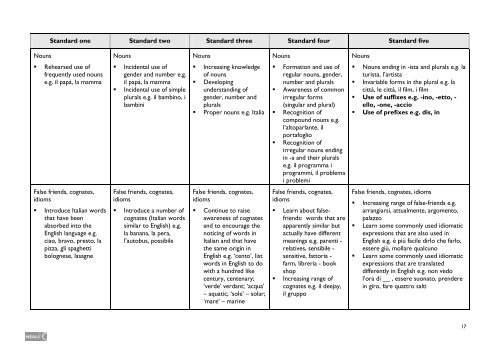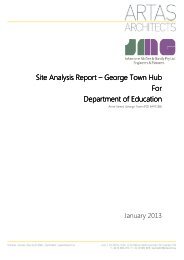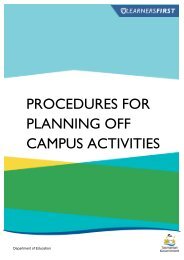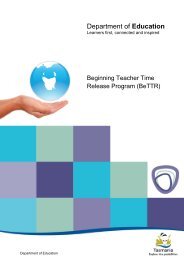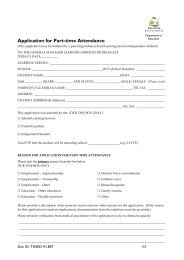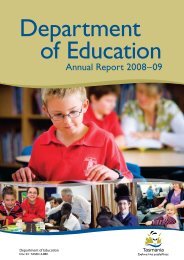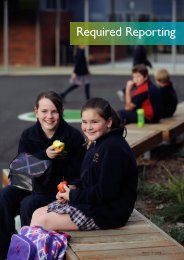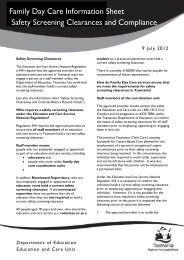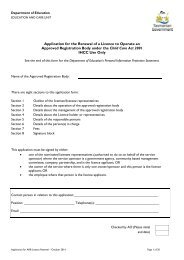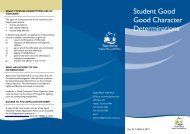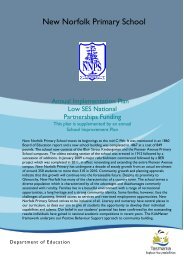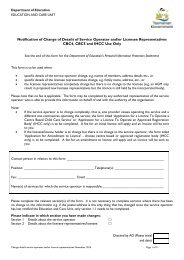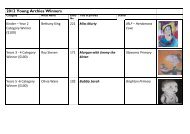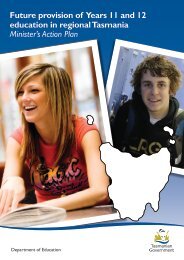Tas Curriculum K-10 - Languages - Italian - Department of Education
Tas Curriculum K-10 - Languages - Italian - Department of Education
Tas Curriculum K-10 - Languages - Italian - Department of Education
You also want an ePaper? Increase the reach of your titles
YUMPU automatically turns print PDFs into web optimized ePapers that Google loves.
Standard one Standard two Standard three Standard four Standard five<br />
Nouns<br />
Rehearsed use <strong>of</strong><br />
frequently used nouns<br />
e.g. il papà, la mamma<br />
False friends, cognates,<br />
idioms<br />
Introduce <strong>Italian</strong> words<br />
that have been<br />
absorbed into the<br />
English language e.g.<br />
ciao, bravo, presto, la<br />
pizza, gli spaghetti<br />
bolognese, lasagne<br />
Nouns<br />
Incidental use <strong>of</strong><br />
gender and number e.g.<br />
il papà, la mamma<br />
Incidental use <strong>of</strong> simple<br />
plurals e.g. il bambino, i<br />
bambini<br />
False friends, cognates,<br />
idioms<br />
Introduce a number <strong>of</strong><br />
cognates (<strong>Italian</strong> words<br />
similar to English) e.g.<br />
la banana, la pera,<br />
l’autobus, possibile<br />
Nouns<br />
Increasing knowledge<br />
<strong>of</strong> nouns<br />
Developing<br />
understanding <strong>of</strong><br />
gender, number and<br />
plurals<br />
Proper nouns e.g. Italia<br />
False friends, cognates,<br />
idioms<br />
Continue to raise<br />
awareness <strong>of</strong> cognates<br />
and to encourage the<br />
noticing <strong>of</strong> words in<br />
<strong>Italian</strong> and that have<br />
the same origin in<br />
English e.g. ‘cento’, list<br />
words in English to do<br />
with a hundred like<br />
century, centenary;<br />
‘verde’ verdant; ‘acqua’<br />
– aquatic; ‘sole’ – solar;<br />
‘mare’ – marine<br />
Nouns<br />
Formation and use <strong>of</strong><br />
regular nouns, gender,<br />
number and plurals<br />
Awareness <strong>of</strong> common<br />
irregular forms<br />
(singular and plural)<br />
Recognition <strong>of</strong><br />
compound nouns e.g.<br />
l’altoparlante, il<br />
portafoglio<br />
Recognition <strong>of</strong><br />
irregular nouns ending<br />
in -a and their plurals<br />
e.g. il programma i<br />
programmi, il problema<br />
i problemi<br />
False friends, cognates,<br />
idioms<br />
Learn about falsefriends:<br />
words that are<br />
apparently similar but<br />
actually have different<br />
meanings e.g. parenti -<br />
relatives, sensibile -<br />
sensitive, fattoria -<br />
farm, libreria - book<br />
shop<br />
Increasing range <strong>of</strong><br />
cognates e.g. il deejay,<br />
il gruppo<br />
Nouns<br />
Nouns ending in -ista and plurals e.g. la<br />
turista, l’artista<br />
Invariable forms in the plural e.g. la<br />
città, le città, il film, i film<br />
Use <strong>of</strong> suffixes e.g. -ino, -etto, -<br />
ello, -one, -accio<br />
Use <strong>of</strong> prefixes e.g. dis, in<br />
False friends, cognates, idioms<br />
Increasing range <strong>of</strong> false-friends e.g.<br />
arrangiarsi, attualmente, argomento,<br />
palazzo<br />
Learn some commonly used idiomatic<br />
expressions that are also used in<br />
English e.g. è più facile dirlo che farlo,<br />
essere giù, mollare qualcuno<br />
Learn some commonly used idiomatic<br />
expressions that are translated<br />
differently in English e.g. non vedo<br />
l’ora di __ , essere suonato, prendere<br />
in giro, fare quattro salti<br />
17


